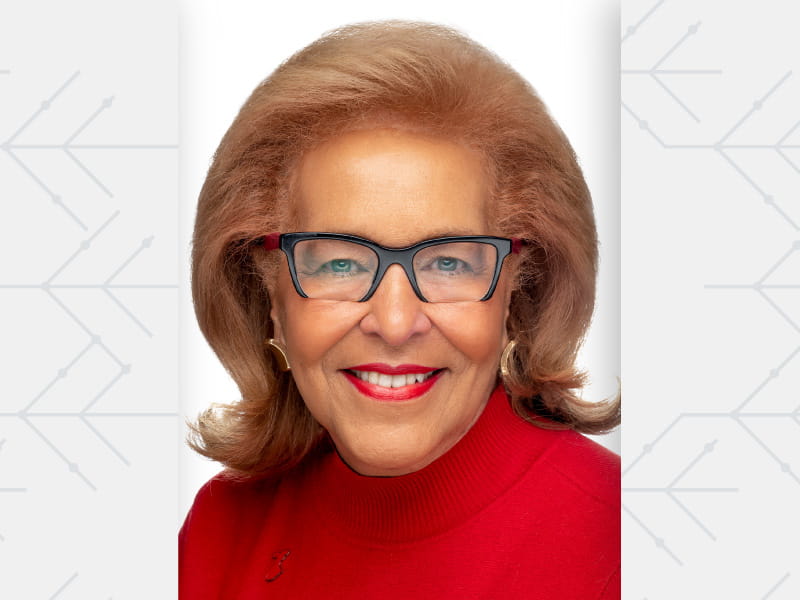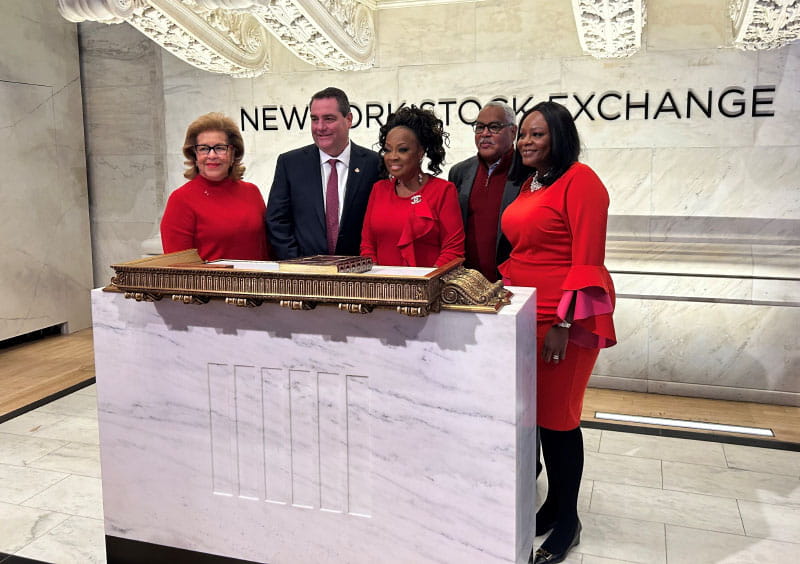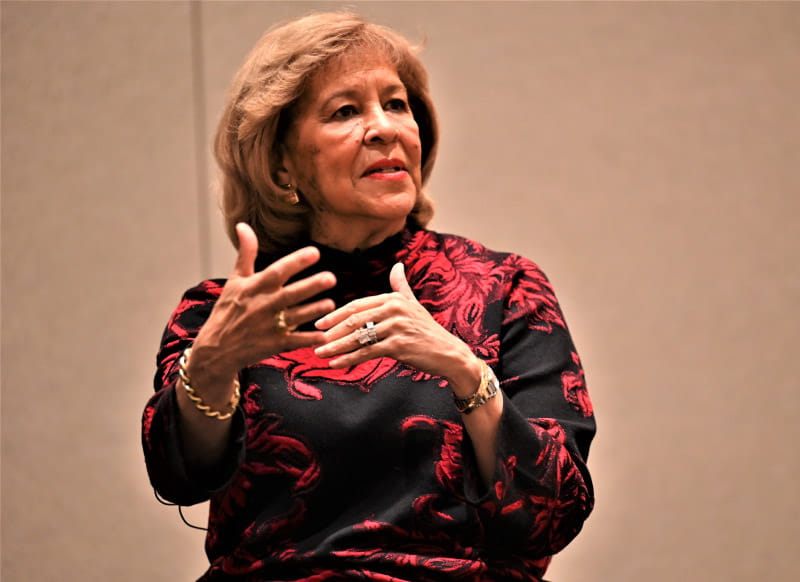New AHA board chair Marsha Jones knows all about navigating challenges

Early on a Tuesday morning, Marsha Jones was meeting in a corporate boardroom with about 25 colleagues, all fellow women financial advisers. They'd come from around the world to discuss how their company could better support their careers.
They heard a loud noise.
The boardroom concierge rushed in and said, "There's been an accident."
An airplane had hit the building across the street. The World Trade Center.
Another plane hit the second twin tower while Jones and the other women navigated 33 flights of stairs. Exiting the building, they entered pandemonium.
They saw debris falling. People, too.
"There's no point in staying here," someone said. "We need to move!"
A colleague lived in the Chelsea neighborhood, so they headed there. Sticking close to each other, they walked to the West Side Highway and turned north. Nearly 3 miles away, Jones turned back.
"That's when we saw the first building collapse," she said. They later learned an eruption of heat, metal and dust whooshed toward the spot where they'd been standing.
The most gripping part about Jones' story from Sept. 11, 2001, however, isn't what happened that day. It's what she did to help her company, Merrill Lynch, recover from that day.
Jones spearheaded rebuilding that office — not the physical space, but rather the spirit of it, as well as its vital role in the company's legacy. Her success led to more prominent roles, followed by yet another unique challenge — not only becoming chief diversity officer for PNC Financial Services, but creating the diversity department for a regional bank that was becoming a national one.
On July 1, Jones takes on her next leadership challenge. She's starting a two-year term as chairperson of the national board of directors for the American Heart Association.
"Marsha's vision, wisdom and guidance will benefit every aspect of our organization," AHA Chief Executive Officer Nancy Brown said. "Her commitment to the values we hold most dear are a perfect fit to carry us into our 100th anniversary next year and as we launch our second century."
***
Before working for major financial institutions, Jones worked in another profession where numbers mattered.
She taught elementary school.
She worked in the South Bronx by day while working toward her master's degree at Columbia at night. She earned her degree in June 1973. When school started that fall, budget cuts had shrunk the job market for new teachers.
Needing another way to pay the rent, she joined a program that trained her to become a secretary.
An alum of that program now working on Wall Street spoke to Jones' class. The visitor mentioned the added training needed to work there. That alone appealed to Jones.
"As an educator, you are a constant learner," she said.
Jones wound up as the assistant to a man who was starting a business that studied mutual funds. His company — Lipper Analytical Services — began to transform the field, and she had a front-row seat.
After years of apprenticing, she made the jump to becoming a trader. Then, while working on the government securities desk, she realized something. She was better suited for sales than trading.
This was the 1980s, when it was unusual for stockbrokers to be Black or women — much less both. Jones figured she needed the credibility of working for a major firm. She interviewed with Merrill Lynch and got hired the same day.
***
Growing up, Jones picked up a nickname from one of her friends: "The Crusader."
She earned it by becoming the first female crossing guard at her elementary school. And by leading a strike of the girls in her choir to make sure they got paid, just like the boys did. (This wasn't about equal pay, it was about getting paid, period.)
Seeing few women and no Black people in management at Merrill, The Crusader set out to change that.
The path to promotion, she realized, was less about gender or skin color and more about the bottom line. She needed dominating sales figures.
"So I did that," she said.
Next, she went through the company's assessment center, enduring rigorous training and evaluations. She came out of it with a management job. She also landed a mentor who helped her understand the nuances of the corporate culture. Among those nuances was the fact that as he rose, so did she.
Jones became the company's first woman to be national sales manager. She was in that role when the planes hit the twin towers.
At the time, Merrill had about 200 people spread across two floors of Two World Financial Center. In addition to the bevy of people, there was the office's history: Merrill's first sales department. That's why everyone called it "S.D." Further stoking its legacy, the walls were lined with photos of former directors of that office, many of whom went on to more powerful roles.
The building itself endured relatively minor damage, allowing Merrill to reopen its office within a year. But it wasn't the same place it had been.
While no one died there Sept. 11, the team did suffer a casualty — a financial adviser who'd been meeting with a client high up in one of the towers. Countless others sustained PTSD, including a woman who happened to be looking out the window when the first plane hit and could never shake that image.
The company needed someone strong and steady to take over this location. Someone who understood its history and machinations. Someone who could persuade members of that office to return and who could recruit others to join them.
That someone, of course, was Jones. She became the first Black person to hold that job, leading a team that included a core group of 75 that returned together with their respective sales associates.
"To some extent, you're a professional family, right?" she said. "You recognize that, yes, there's a job that we're doing on a day-to-day basis, but at the end of the day, we're all human beings. You have to care for one another. You have to recognize that and make it part of the culture of your organization."
***
Jones continued to climb the ranks at Merrill. Not long after it became part of Bank of America, she took a call from a friend.
The woman invited her to a meeting with Jim Rohr, the CEO of PNC.
"What's PNC?" Jones asked.
Based in Pittsburgh, the company was a "super regional" and still expanding. Rohr wanted to create the position of chief diversity officer.
"I am not an HR person," she told him. "I am a wealth management person. Looking at this from a business standpoint, you've got all kinds of opportunities for diversity to drive revenue."
Rohr liked what he heard. She got the job, and both Rohr and the entire executive committee supported putting her ideas into action. When a new CEO took over in 2013, the commitment from the top remained strong.
Jones made it work by fostering the concept of a professional family. It also could be described as the kind of inclusivity found in a fourth-grade classroom.
"If every single manager created an environment where every employee felt that they belonged, and that they were contributing, and that everybody was on the same page, then the manager would be more effective, and that team would be more effective, more innovative and more profitable," she said. "And when you connected the dots across the organization, that would have a positive impact to revenue."
***
Because PNC plays a large role in Pittsburgh, its executives were in high demand there from nonprofit organizations seeking volunteers.
Jones became president of the YWCA of Greater Pittsburgh, chair of the Advanced Leadership Institute (an organization that focuses on development of Black executives in the Pittsburgh area and, soon, nationally) and on the board of the Imani Christian Academy.
She also joined the local board of the American Heart Association.
At first, it was because she believed in the mission. Then her dad died of complications from a stroke. Upping her involvement became a meaningful way to honor his memory.
"And then one thing kind of led to another," she said, laughing.
She rose from the local board to the regional board to the national board. On the national board, she served on the audit committee, then became its chair. That led to a term as treasurer and, in mid-2022, she was selected to succeed Ray Vara as national board chairperson.

***
Jones' selection as chairperson-elect came a few months after she took on another new role in her professional career.
Retiree.
Now living in Florida, she remains involved in the corporate world through an executive consulting and coaching practice she started with a former Merrill colleague. Like her, he broke several glass ceilings for Black employees.
When not volunteering or doing her new job, she's probably working on her latest hobby: mahjong. She plays once a week with a group of ladies from the community where she lives and enjoys practicing online.
"To me, it's an adult video game," she said, laughing.
The other devotion is her family. She and her husband, Roderick, have three children and eight grandchildren. The youngest generation ranges from a 25-year-old woman playing professional basketball in Mexico to an 18-month-old boy.
***
As she scaled back on work, why did Jones ratchet up her involvement with the AHA?
The list of reasons is long. It includes her support of the AHA's emphasis on health equity for all and the fact that CEO Brown and fellow board members are as committed to it as PNC's leaders were to diversity.
She's also inspired by what she described as the organization's ongoing evolution. She loves that the AHA is going into its second 100 years and still looking for ways to improve, such as harnessing new technologies and addressing shifts in demographics.

During her term, Jones aims to increase CPR training, particularly in under-resourced communities. She also hopes to see more diversity in the volunteer ranks, from committees to boards.
"There are opportunities for us to bring in voices from various generations that perhaps are not as well represented as they might be, particularly since they're going to be our future — Gen Z and millennials, for example. And I think we have the opportunity to be able to move into the Hispanic community in perhaps a way that we have not necessarily fully capitalized on," she said. "So when we think about representation, engagement and volunteerism, there are still pockets for growth. It's very exciting."





